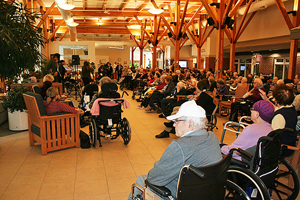Local News
Simkin Centre – and all other personal care homes in Manitoba facing unprecedented pressures due to COVID-19

By BERNIE BELLAN
Even though the Province of Manitoba has eased the rules governing personal care homes and how visitors will now be able to see loved ones, the financial pressures facing all personal care homes in Manitoba had been huge even before the pandemic set in.
There had been quite a few reports in different media within the past week about the dire situations in which all personal care homes find themselves these days. With the double whammy of having to deal with all the attendant problems associated with COVID-19 – in addition to the severe financial pressures all personal care homes were facing long before the virus struck, staff at pch’s are not only having to deal with the anxiety residents are feeling, they are also having to deal with families of residents who have been beside themselves with concern for their loved ones.
I reached out to Laurie Cerqueti, CEO of the Simkin Centre, to see whether there was anything she (or anyone else at the Simkin Centre) could tell me about how staff there are coping with the unprecedented pressures which have been thrust upon them these past four months.
I had sent the following email to Laurie (who is always quick to respond – and who doesn’t shy away from answering tough questions) on July 10: (I should note that, in my original email, I suggested that the last time I had been to the Simkin Centre, in May – just around the time outside visits were beginning to be allowed, it seemed to me that I saw volunteers helping with the outside seating. In her response to me Laurie explains that I was mistaken. There were not any volunteers helping with the outside visits.)
Hi Laurie,
I know how under the gun everyone is at Simkin Centre but I’ve talked with the families of some residents and, as I’m sure you’re aware, they’re terribly frustrated over not being able to see their loved ones beyond the rare occasions when you have sufficient staff to allow outside visits.
A few of them have told me they’re quite willing to volunteer to help with those visits – if that would be allowed.
Is there any way volunteers can be involved in helping with family visits?
Regards,
Bernie
Here was Laurie’s response:
Hi Bernie
We have not used volunteers to assist with visits, however we are exploring as to how this might work as well as other strategies that would help us be able to offer more visits. I know of many people that would gladly help us out and I am very thankful for this. As you know government has given us no extra resources to be able to do this. We are having to manage this from within existing resources. In this week’s edition of the Simkin Star you will see that statistics for visits we have been able to support so I would not classify visits as rare. We are also bound by public health directives as far social distancing, inside visits should be limited and in a designated area close to the entrance and visitors must wear a mask. In room visits are not permitted at this time unless it is an end of life situation.
All personal care homes and family members in the province are expressing similar concerns and frustrations to ours. We have shared our frustrations and concerns with the WRHA, Shared Health and government.
It really is a very sad and difficult situation we find ourselves in and I am very proud of how our team has managed. This is no longer a sprint, this is now a marathon. I am also thankful for the support of our Board, family members and community.
Laurie

Accompanying this article is a reproduction of the statistics to which Laurie referred in her email about the number of visits that have been facilitated at the Simkin Centre.
In a subsequent email (on July 15) Laurie added that Simkin has begun incorporating some inside visits to what it had already been doing. She wrote: “We have also started indoor visits (not in rooms) last week. We will never be able to meet the full demand for visits until there are no longer restrictions.”
I asked her to expand upon what Simkin is now doing.
Laurie responded: “At this time, occurring only Thursday mornings as indoor visits should be limited, outdoor visits are Public Health’s recommended type of visit. Last week the visits were held in the synagogue. We had 2 visiting stations. The feedback was that the acoustics were bad so this week we are moving visits to the multi purpose room and there will be 4 stations. If it goes well we may be able to increase. I also purchased additional canopies and tables and starting Friday we will have 6 stations outside. We are also using donated funds and have hired some more summer students to assist with the visits. Scheduling, transporting residents, screening visitors, supervising visits and sometimes assisting with the actual visit makes them incredibly labor intensive. We really are trying.”
On July 13, along with other media in the province, we received an impassioned plea for more help for personal care homes from The Manitoba Association of Residential and Continuing Care Homes for the Elderly (MARCHE).
That particular communication stated that “personal care homes in Manitoba have been chronically underfunded for years and resident care is suffering as a result.
“Lack of funding, human resource challenges and aging infrastructure are issues not just in Ontario and Quebec,” says MARCHE Executive Director Julie Turenne-Maynard. “Many personal care homes—including all of those in Winnipeg—have not seen any funding increase for basic operations in more than 10 years. During that same time, dietary expenses at MARCHE homes increased by 36% and the cost of incontinent supplies increased 50%. Funding of these items had to come at the expense of other departments.”
The email from MARCHE went on to describe problems associated with aging infrastructure in many pch’s.
To be fair, the Government of Manitoba did respond to the MARCHE communication. This is not the place, however, to debate the degree to which the Province is providing sufficient funding for pch’s.
Rather, it is simply an attempt to describe a situation which is probably quite apparent to anyone closely associated with a personal care home, whether as a resident, a member of the staff, or a family member. Personal care homes, including the Simkin Centre, have found themselves at the epicenter of the fight against the virus – but let’s not pile on the staff at that particular facility when they have been providing the best possible care under the circumstances. As much as family members would like to be able to have outside visits more regularly, let’s remember how extraordinarily difficult it is for a facility such as the Simkin Centre to manage itself in these times.
Local News
New Israeli restaurant opens in River Heights

By BERNIE BELLAN (July 6, 2025) It’s been a long time since our community has been able to welcome the opening of a restaurant that specializes in Israeli food.
That void is now going to be filled with the opening of The Green Falafel, at 1833 Grant (corner of Centennial – next to the Subway).

The restaurant is the fulfillment of a dream long held by the husband and wife team of Ariel and Eden Maudi, who have been living in Winnipeg the past 11 years.
Ariel, who was born in Israel and grew up in Beer Sheva, says that he worked in telecommunications in Ramat Gan for several years. He adds though that he had always dreamed of owning his own falafel stand in Israel, but life was difficult there and he decided to come to Canada as a tourist to see whether there were any opportunities here for him, Eden and their two young children.
Eden, who was born in Russia and moved to Israel with her family in 1996, stayed behind with the two kids, who were both pre-schoolers, while Ariel tested the waters in Canada first.
Ariel says he came to Canada as a tourist in 2013. His first stop was in Toronto, where he acquired his 1st class driver’s license. At the end of 2013 he moved to Winnipeg where he began working as a truck driver. Soon he found himself employed as a successful sales person at Vickar Nissan where, he says, he once achieved the status as the top car sales person in Canada. After working at Vickar Nissan for a number of years, Ariel began working as an installer for Bell MTS.
Meanwhile, Eden began working at a Walmart, later at the Costco on Regent.
But, when the opportunity to move into a space that had been previously occupied by another restaurant, but which had closed, became available, Ariel and Eden decided to open their own Israeli restaurant in an area that hadn’t seen Israeli food served since the controversial closure of Bermax Café in 2019.
The Maudis say that they will be serving a variety of Israeli dishes – all vegetarian, and that they will be fully kosher.
The “green” in Green Falafel, by the way, Ariel Maudi explains, comes from the cilantro and parsley that are added to the chickpeas. In addition, their pitas will be coming from Israel and will be baked fresh daily.
The Green Falafel will be open from 10-8 daily. Delivery will be available through Uber Eats and DoorDash.
Call 204-557-7837 for information.
Local News
Previews of shows with Jewish performers at this year’s Fringe Festival July 16-27

For show dates and venues go to winnipegfringe.com
By BERNIE BELLAN As has been our custom for many years now we try to find shows that have either Jewish performers or themes that would have particular appeal for Jewish audiences. Many of the Jewish performers at this year’s festival have been here before, but several are new. In no particular order here are blurbs about the shows we’ve found that fit the criteria I’ve just described. (By they way, if we’ve omitted a show that should be included in our list there’s plenty of time to get added to this post. Just drop me a line at jewishp@mymts.net.)

You’ve Been Served: A One-Woman Show About Divorce, Cults, and Coming of Age at Midlife
Noemi Zeigler
You are hereby summoned… to laugh, cry, and maybe belt out a Streisand number in solidarity. You’ve Been Served is a raw and riotous solo comedy by writer-performer Noemi Zeigler. It all begins when Noemi is served divorce papers on top of a garbage bin lid while taking out the trash—an undignified start to a full-blown midlife unraveling.
At 50, still clinging to her dream of becoming a singer, she falls under the spell of a music producer slash self-help guru, joins a spiritual cult, and, instead of landing a record deal, she lands in jail. Behind bars, with help from her long-buried inner child, she begins to reclaim her voice and her power. Turns out, dreams really do come true—just not the way she expected.
The show features vividly drawn characters—including a manipulative cult leader, a toxic ex-husband, and a jail guard named Roach who shares Noemi’s obsession with the fashion of Charlie’s Angels (the ‘70s TV version, of course.)
With salsa dancing, twerking, and a belting rendition of Don’t Rain on My Parade, Zeigler dives into abandonment, reinvention, and self-rescue. As she confronts perimenopause, she discovers it’s not the end—it’s the new puberty. The show touches on grief, sexuality, and spiritual confusion, but Noemi’s childlike optimism asks: What if your breakdown is actually your breakthrough?

You’re good for nothing… I’ll milk the cow myself
Written & Performed by Natacha Ruck
France, 1981: The first socialist president is about to be elected and young Natacha is ready to implement her own political platform. But first, she has to take down the schoolyard bully,emasculate the rules of French grammar and make off with grandmother’s chocolate.
If you think you know the limits of Jewish mothers, evil grandmothers and transcontinental lovers, meet Natacha Ruck’s family. This true tale of three generations of women, facing three world wars, is equal parts hilarious, shocking and zany.

A One Human Being, Potentially Comedic Performance of Beauty and the Beast NEW WORK!
Written & Performed by Alli Perlov
Be our guest! Local high school drama teacher Alli Perlov is back for a tale as old as time. Can she sing? Not really. Can she act? That’s debatable. Will you laugh? Oh… probably.
Perlov plays dozens of characters, some human, some animal, and many objects, in a comedic exploration of Beauty and the Beast.
In an homage to this brilliant musical adventure, through witty commentary and unstoppable energy, Perlov aims to entertain an audience that isn’t forced to be there like her students.

Hockey Sticks and Beaver Pie
Written & Performed by Melanie Gall
Take a trip around Manitoba. From the 30,000 ft. St. Adolphe snow maze to the Narcisse snake dens! After all, where else holds both the title of Slurpee Capital of the World and the Guinness Record for the most people simultaneously howling like wolves?
Deanna Durbin, Terry Jacks and Burton Cummings are among the many homegrown stars, and Hockey Sticks features their music along with original songs and the stories that make this province unique.
Starring Melanie Gall from past shows Piaf & Brel, Ingenue and Toast to Prohibition

Nerohilarity Exposed
Produced by Adam Schwartz
We all sometimes feel exposed, whether that’s as a fraud or a pretender.
The performers of the award-winning Neurohilarity show, Danielle Kayahara (Laugh Out Loud CBC), Carole Cunningham (Yuk Yuks, The Debaters), Adam Schwartz (Winnipeg Fringe) and Rollin Penner (Yuk Yuks, CBC, Rumors, Winnipeg Comedy Festival), apply a comedic spin to the experiences that make us feel insecure, stripping away the emotional weight with nittygritty jokes and stories that will have you laughing uproariously.
Brilliantly awkward.

A Lesbian in the Kitchen
Willow Rosenberg
Professional lesbian Willow Rosenberg takes you on a journey through the centuries, superstitions and tablespoons of her lifelong passion for baking in this spiritual successor to 2024’s Jenny Award-nominated A Lesbian in a Bear Store.
Whether you have a favourite spatula, bake once or twice a year, or live in constant fear of being told to “just fold it in”, this one-woman show about family, joy, tradition (but make it gay),
Judaism, comfort, home (but make it gayer*), love, chemistry and magic is for you!
*Who’re we kidding, it’s all gay!

Eleanor’s Story: An American Girl in Hitler’s Germany
Written & Performed by Ingrid Garner
(Ed. note: Although Ingrid Garner isn’t Jewish, we thought the theme of this show might have a special appeal for Jewish readers.)
Based on Eleanor Ramrath Garner’s best-selling memoir, this 16x internationally award-winning adaptation – performed by her granddaughter, Ingrid Garner – details Eleanor’s youth as an American caught in Second World War Berlin.
Punctuated with humour and accompanied by cinematic sound and video, Garner embodies her ancestors in this coming-of-age odyssey, delivering an account of war that is more relevant than ever.

Reviewing The Free Press 2
Benji Rothman
The Winnipeg Free Press has run amok, reviewing each and every Fringe show over the past two decades without consequence or recourse. Now, it’s their turn… again.
In this refurbished work that debuted at last year’s Winnipeg Fringe, Benji Rothman once again takes the Winnipeg Free Press to task. In this (mostly) new, (hopefully) hilarious 45-minute show, Rothman dives deep into their past and exposes their faulty journalism, imbalanced reporting and, of course, embarrassing typos.
Local News
Jewish performers at this year’s Winnipeg Folk Festival July 10-13

The Black Sea Station
Long ago, there were the klezmorim, itinerant musicians who roamed the back streets of Eastern Europe, playing at parties for meals and a few coins. The sound they honed then was a visceral exploration of life’s joy, and its loss; they could whip audiences into a frenzy of dancing, or bring them to tears with the mournful wail of a clarinet. Today, Winnipeg’s own The Black Sea Station is carrying on this tradition. Featuring Daniel Koulack (bass), Victor Schultz (violin) and Myron Schultz (clarinet) — cofounders of seminal local klezmer act Finjan — along with Moldovan accordion wizard Nikolai Prisacar and multi-instrumentalist Ben Mink, the quintet transports listeners to a time and place long past. Through a mix of original songs rooted in history, and traditional tunes spun up with modern zest, they whirl through the exuberant klezmer sounds of their Eastern European heritage, tending the old ways with deep love and respect.
The Black Sea Station will be performing Sunday, July 13, at 1:00 pm in Snowberry Field.

Romi Mayes
Romi Mayes has taken some hard knocks in her life, but she’s never faded away. For more than 25 years, Manitoba’s first lady of blues-rock has been a lynchpin of the Canadian roots scene. She earned that position the old-fashioned way, through her gritty, passionately emotive music. With her sizzling guitars and full-throated rasp, the Juno-nominated performer howls and purrs through razor-edged lyrics, rocking out wherever she can find a stage. She’s long been one of the hardest-working musicians on the circuit, keeping a busy slate of gigs and mentoring up-and-coming artists to get a foothold on the trails she blazed. Now, after a nine-year hiatus from the studio, Mayes has put her scintillating sound back on record with her long-awaited seventh album, Small Victories — a return that leaves no doubt, no matter the ups and downs, Mayes is here to stay.
Romi will be performing Friday, July 11, at 1:00 pm in Burr Oak.

Leonard Podolak (with Matt Gordon)
Ireland’s Matt Gordon is a fiddler and singer, whose fleet-footed clogging and thigh-slapping hambone has taken stages by storm since the 1980s. Leonard Podolak is a virtuosic master of the clawhammer banjo, who for decades has whipped up some of Manitoba’s wildest roots parties with his band, The Duhks. Put those talents together, and they can promise you this much: we’re all gonna have a real good time. Longtime friends and musical collaborators, Gordon and Podolak deliver an exhilarating trip through old-time Appalachian music. Their performances seamlessly blend intricate instrumental lines with heartfelt singing and dazzling dance. They’ve teamed up on a few records over the years, including 2020’s bigband extravaganza Power Wagon: Live At Shanley’s. But the best way to experience this duo’s toe-tapping, hand-clapping chemistry is to see it live.
Podolak and Gordon will be performing A concert with a side of clogging Sunday, July 13, at 3:00 pm in Folk School.
